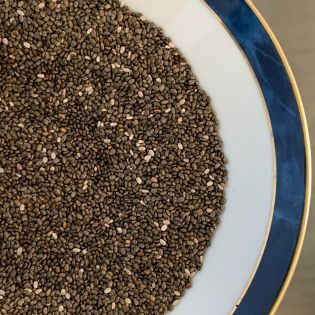BENEFITS OF CHIA SEEDS

Often referred to as a “superfood,” chia seeds are tiny black and white seeds from the desert plant Salvia hispanica, a member of the mint family. Chia seeds contain several components that, when eaten as part of a balanced plant-rich diet, may prevent the development of various chronic diseases. Chia seeds are a highly versatile ingredient. They have little if any distinctive flavor, so they don’t compete with other flavors in a dish. They also soften in the presence of liquid and become a less detectable texture.
Nutritional Content Of Chia Seeds (2 Tbsp)
- Calories - 131 kcal
- Fats - 8.4 g
- Carbohydrates - 13.07 g
- Fiber - 11.2 g
- Protein - 5.6 g
- Sugar - 0 g
Rich Source Of Proteins
- Chia seeds are a complete protein and contain all nine essential amino acids that cannot be made by the body. You need these amino acids for energy production and immune function within your body. Chia seeds increases the amount of high-density lipoprotein (HDL) cholesterol and lowers low-density lipoprotein (LDL) cholesterol. HDL cholesterol is also known as “good” cholesterol, while LDL is known as “bad” cholesterol. Chia seeds have a protective effect on the balance of lipids in the blood and a neutral or beneficial effect on other markers of cardiovascular health.
Good Source Of Fiber
- Chia seeds are a good source of fiber which may help lower cholesterol levels, improve digestive health, and maintain blood glucose levels. When combined with water, chia seeds can help you feel full longer and reduce constipation. The high fiber content is also beneficial to gut health by fueling our healthy gut microbes. A diet with adequate fiber helps prevent constipation and keeps the digestive tract healthy, but many Americans do not eat enough. Chia seeds can help people to meet dietary requirements for fiber. The daily recommendation for adults is 25–30 g, so a serving of chia seeds can fulfill 30% of this.
Rich In Antioxidants
- Another surprising health benefit of chia seeds is they are an excellent source of antioxidants and polyphenols such as caffeic acid, myricetin, quercetin, rosmarinic acid, and others. Antioxidants are substances that may protect your cells against free radicals, which may play a role in cancer, heart disease, and other diseases, while polyphenols are beneficial plant compounds with antioxidant properties that may help keep you healthy and protect against various diseases.
High In Minerals
- Chia seeds also have minerals including calcium, iron, magnesium, and zinc. Calcium and magnesium help maintain healthy bones while zinc is essential for cell division and growth. It is also an essential element needed to support the body's immune system. Instead of supplements and vitamins, reach for a sprinkle or two of chia seeds at your next meal. They are high in omega-3 fatty acids and fiber. Chia provides a similar amount of omega-3 fatty acids as ground flaxseed in the form of alpha linolenic acid, or ALA. They can help with weight loss.
Low In Calories
- Chia seeds can add a low calories crunch to any meal or snack. Because they’re also a great source of fiber, adding chia seeds to your low-calorie snack or meal can help you feel full for longer while still following a low-calorie diet. When used in moderation, chia seeds may help you feel more satisfied and less likely to eat too much. The fiber and protein in chia seeds may benefit those trying to lose weight.
- Chia seeds are an excellent source of many nutrients. One ounce of chia seeds can help contribute toward your daily value of fiber, protein, minerals, and B vitamins. Chia seeds are also rich in antioxidants, such as polyphenols. Antioxidants fight free radicals that can damage your cells. When you eat chia seeds, you also get a sizeable dose of healthy fats, including omega-3 fatty acids. Omega-3s are essential for brain and eye health, immunity and even heart health.


